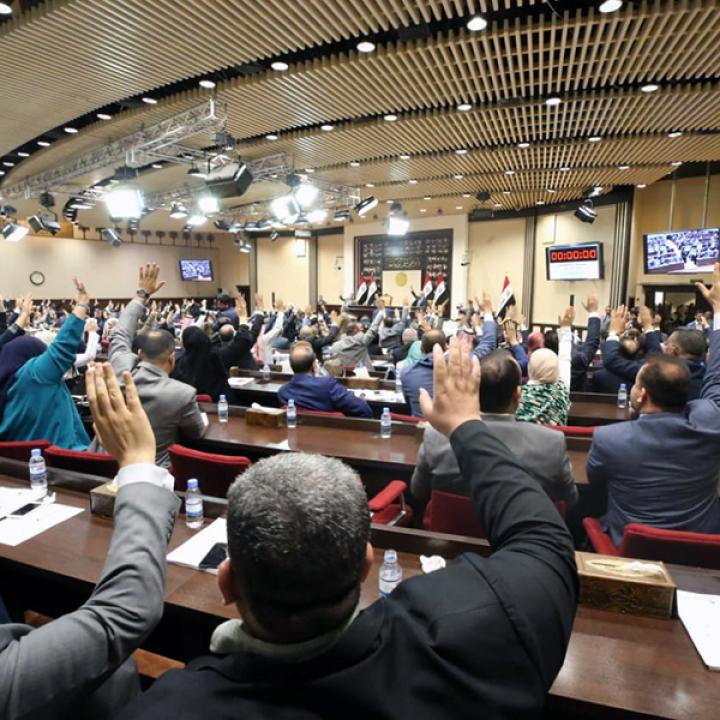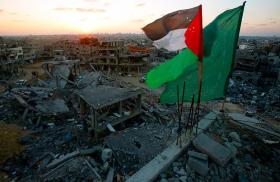
- Policy Analysis
- PolicyWatch 3661
Scoring Iraq’s New Government: Metrics for Preserving U.S. Interests

The protracted post-election process has been a step backward for Iraqi democracy, so Washington will need to closely monitor the new leadership’s actions and hold Baghdad to measurable benchmarks.
Iraq’s stalled government formation process finally lurched forward on October 17, with new president Abdul Latif Rashid taking office more than a year after the 2021 election. Incoming prime minister Mohammed Shia al-Sudani will now try to ratify his cabinet during a parliamentary session on October 22. If he succeeds as expected, Baghdad will finally close perhaps its most troubled electoral cycle yet—a chapter in which a clear popular vote nearly failed to produce a peaceful transition of power, and the losing factions spurred the biggest winner to abandon parliament through corrupt judicial rulings.
Under these sad circumstances, the U.S. government and its partners need to quietly but insistently push for early, inclusive elections to restore legitimacy to the democratic process. Simultaneously, all of Iraq’s friends must watch the new government like a hawk to ensure that militias and corrupt politicians do not attempt to purge technocrats, conduct witch hunts against Western-leaning officials, cover up past graft, or initiate a new wave of “asset-stripping” via state institutions. After many false alarms, the survival of Iraq’s close relationship with the West is truly at stake right now, and only firm expectation-setting can ensure that the partnership continues.
Challenges to U.S. Interests
When the prime minister-elect forms his government, many international observers will understandably feel relief. A former minister and governor, Sudani is an engaging professional politician, and his cabinet will tick some boxes in terms of technocratic credentials and ethnosectarian inclusion. Under this appealing veneer, however, the new government will likely exhibit several disturbing flaws that the United States and other partners cannot just ignore:
- Non-democratic inception. Sudani’s ascension is the result of a failed electoral process in which a successful UN-monitored vote was steadily undermined by the losing parties—the most powerful of which are tied to Iran-backed militias that are formally part of the Popular Mobilization Forces (PMF) but operate outside the state’s authority. First they threatened mass violence; then they tried to kill the incumbent prime minister in a November 7, 2021, drone attack; when that failed, they mobilized corrupt judges to move the legal goalposts so that the winning bloc’s simple majority victory was no longer sufficient to form a government. The challenge for supporters of democracy in Iraq is that this outcome may strike a fatal blow to the citizenry’s already limited faith in the political process and further depress voter turnout. Moreover, the cheated winners of last year’s election—Muqtada al-Sadr’s supporters—may use the situation as justification for destabilizing a country run by their adversaries.
- Upper hand for Iran-backed militias. Members of U.S.-designated terrorist groups such as Kataib Hezbollah, Asaib Ahl al-Haq, and other Iranian proxies were elected to the new parliament, and some of them may soon become cabinet ministers. Sudani does not hide his connection to sanctioned militia politicians such as Faleh al-Fayyad and Hossein Moanes. The situation is analogous to the formation of Adil Abdulmahdi’s cabinet in 2018, in which Iran-backed terrorist groups and other proxies were handed leading roles in the state. For instance, Muhsin al-Mandalawi of the Iran-backed Coordination Framework has been named the new deputy speaker of parliament, and he has already met with Abu Fadak, a U.S.-sanctioned militia leader. Some of these militias have also been aiding the Iranian regime’s current crackdown on protesters inside the Islamic Republic, so they are highly likely to resume the protester-killing modus operandi they established back home in late 2019 when they last controlled the government; indeed, Washington sanctioned Fayyad precisely for his role in “directing and supervising the murder of peaceful Iraqi demonstrators” that year.
- Potential for state disintegration and future security crises. When the militias last ran Iraq under Abdulmahdi’s government (2018-2019), they intensified the process of asset-stripping the state, including its U.S. dollar reserves, oil exports, military budget, port revenues, and international airports. Sudani’s incoming government is now poised to return to this course, likely with the same militia politicians (Fayyad, Nouri al-Maliki, U.S.-designated terrorist Qais al-Khazali, and Hadi al-Ameri) at the helm. They will also have the ascendant Higher Judicial Council head Faeq Zaidan to help them via tailor-made Federal Supreme Court rulings, so these and other abuses could occur on an even wider scale. Moreover, in 2018-2019, such activity coincided with heightened security threats against U.S. citizens in Iraq and increased militia-supported attacks on neighboring countries.
Measurable Indicators of Iraqi Partnership
The last time militias ruled the country, Baghdad’s relationship with Washington nearly came apart: Iran-backed groups breached the U.S. embassy, the White House came close to ordering a full military withdrawal, and U.S. forces killed large numbers of militiamen, including senior players such as Iranian general Qasem Soleimani and PMF chief Abu Mahdi al-Muhandis. The outward pattern may be different this time, with Iran’s militias employing more guile, reducing their attacks on Americans, and lowering the profile of their leaders. Under the surface, however, the U.S.-Iraq relationship will eventually falter—perhaps more slowly if Democrats hold the White House and Congress, but inevitably just the same. Some of the most immediate potential repercussions are stark:
- If militias purge or quietly sideline trusted U.S. partners in the military and the Iraqi National Intelligence Service (INIS), Washington may instantly downgrade Baghdad as a partner that can be trusted with sensitive intelligence and technology.
- If militias and other Iranian agents once again try to use Iraq’s Central Bank as a dollar-denominated slush fund, the U.S. Treasury Department will likely begin cutting off Baghdad’s access to dollars and the global financial system.
Returning to the 2018-2019 path would be equally ruinous in domestic terms—after all, that approach sparked widespread popular uprisings against the militia-run government and even drew in the Iraqi religious establishment. Sudani may be friendly and capable, but so was Abdulmahdi when he ascended to power, right before he handed the reins to Iran’s proxies without hesitation.
The answer for U.S. policymakers is to reactivate a strengthened version of the 2018-2019 “rules of the road,” whereby Iraq was on probation and watched very closely by Washington and other powerful members of the Global Coalition to defeat the Islamic State—a grouping that still functions as a kind of “friends of Iraq” framework. These nations must recognize that their relationship with Baghdad may soon change fundamentally for the worse unless the Sudani government meets a set of measurable markers for reducing militia influence and state-destroying corruption. In Washington, officials should focus on the following metrics to justify maintaining a full partnership with Iraq:
- Rapid commitment to early elections under a fair electoral law. This may improve the chances of preserving democracy and holding instability at bay, based on a promise that independents, Sadrists, and reformers will get to “try again” in an election where the rules of government formation are set before the results are announced, not after. This will require judicial reforms and greater security for independent candidates. Without these steps, the White House and Congress should conclude that Iraq is effectively not a democracy, but rather a country where elections are compromised from the start or undone after the fact by a corrupt judiciary.
- No repression against civilian protesters. Sudani’s backers in the Coordination Framework include individuals known for overseeing the murder of protesters, such as Faleh Fayyad and Qais al-Khazali. Congress should therefore demand that the Biden administration regularly brief legislators to certify that Iraq has not returned to mass repression under the Sudani government; if that metric is failed, budgeted U.S. aid can then be curtailed. A related metric is whether Sudani is willing to immediately prevent state-paid PMF members from crossing the border to assist Tehran’s ongoing crackdown against Iranian protesters.
- Measurable prevention of rocket and drone attacks. Another crucial security metric will be Sudani’s willingness and ability to curb militia attacks against the Kurdistan Region, U.S. forces, and neighboring states. Again, Congress should receive regular briefings certifying a decrease in the frequency and seriousness of such incidents.
- Avoiding purges and politicization. As mentioned previously, Washington should score Sudani accordingly if sensitive institutions such as INIS, Central Bank, and airports experience abrupt or creeping personnel purges. The same goes if the military leadership is politicized (as it was under Prime Minister Maliki in 2010-2014, to disastrous effect), or if militia-adjacent officials end up in deputy minister and director-general slots in key institutions. The administration should brief Congress regularly on command changes in key institutions and certify that new appointments do not represent a pattern of purges and politicization.
- Anti-corruption efforts. Sudani’s government will need to show determined and credible efforts on this front, starting with a U.S.-assisted campaign to trace the 3.7 trillion dinars ($2.5 billion) that disappeared from the Finance Ministry’s tax deposits in fiscal year 2021. If this investigation leads to Sudani’s allies, Washington should take careful note of whether or not he acts against them.
Michael Knights is the Bernstein Fellow at The Washington Institute and cofounder of its Militia Spotlight platform.



